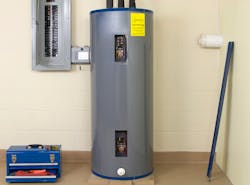The homeowner suddenly found he had rotten-egg odor from his hot water. A water quality specialist suggested that he remove the sacrificial anode. It worked. Unfortunately, it also voided the warranty on the water heater and shortened its life.
If the specialist had known more, he could have offered a more elegant solution.
So what is this strange, smelly phenomenon that afflicts so many people in all parts of the U.S.? And, what can be done about it that doesn”t void the water heater warranty? And for that matter, just what is an anode and what does it do? Could there be a side business for water quality specialists to add on to their primary one to the benefit of them and their customers?
Anode history lesson
Let”s start with the anode. That story begins a couple hundred years ago. Around that time, a fellow named Sir Humphrey Davy made a discovery: Electrolysis. If you put two metals together in water, one will corrode to protect the other.
Which metal is which is determined by where they are on the galvanic scale, also known as the galvanic series. For instance, most plumbers know better than to screw a steel fitting into a copper fitting because the steel will immediately start to rust. It is less “noble” than copper. The metal being protected is the cathode. The metal being consumed is the anode.
There is an old plumber”s tale that installing brass nipples in a steel tank is good, while putting copper fittings in steel is bad. If you look at the galvanic scale, you”ll see that copper and brass are side-by-side. Bronze, too. So, they all are going to force steel to rust. We”ve made that test. Galvanized steel screwed into brass will start rusting within days.
Anyway, magnesium (another of Davy”s discoveries) and aluminum are near the top of the scale, while gold and platinum are at the bottom.
If you could build a water heater from platinum, it would last forever. Interestingly, people did make water heaters out of other materials once upon a time. Copper and monel — a nickel/copper alloy — were used back in the 1940s, and those last just about forever, too — for a lot less money than platinum.
The lowly — and much cheaper — glass-lined steel water heater we see everywhere today doesn”t last forever — but it could. The glass lining mostly protects it, but what protects steel where the glass lining is flawed is one to five sacrificial anodes (the latter number in commercial water heaters) made of magnesium or aluminum or for some odor conditions, aluminum/zinc. All those are higher on the galvanic scale than steel, so they will readily corrode to protect tank steel. We”re going to return to odor soon, but this is a key part of the story.
The anodes are screwed into the top of the tank and extend most of the way to the bottom. When the tank is filled with water, an electrolytic reaction begins whereby the small amount of exposed steel is protected and the sacrificial anode is slowly consumed. When there is little anode left, the steel rusts and the water heater eventually breaks.
On the other hand, if the anode is replaced, the heater will never fail due to rusting through.
Check your anodes
We are continually urging people to check their anodes, but most of them don”t. This is a place where water quality specialists, who service their installations periodically anyway, could make a difference. They could check and change anodes as needed, and even go beyond that and protect their customers on other issues affecting water heaters.
It”s notable that the water heater manufacturers view the anode as tantamount to the warranty. A six-year warranty water heater usually comes with a .75-inch diameter anode; a nine-year has a .84-inch diameter anode; and a 12-year has either a .90-inch anode or a .75-inch hex anode in its own port and a half-length .75-inch combo rod in the hot port.
A combo anode comprises an anode/hot water outlet/plastic-lined steel nipple. Some brands come with just one of this type, while many other heaters have hex-head anodes in a separate port on top of the heater, or one of each.
One leading provider will even add four years to the warranty if someone pays a plumber to install its half-length combo rod in the hot port.
On the other hand, it is clearly stated in all the manufacturers” literature that removing the anode voids the warranty.
Examining odor
There are other factors at play when it comes to water heater longevity, but right now we want to get back to odor. What causes it? If removing the anode removes the odor, why is that so?
There are places where there is so much sulfur in the water that both hot and cold water have a strong odor. But usually, the hot water reeks, while the cold water is fine.
That”s because there are sulfate-reducing anaerobic bacteria, especially in well water, that react with the sulfur and hydrogen created by the action of the anode to cause rotten-egg odor.
Anode protection reduces steel corrosion, but it increases hydrogen gas evolution from the steel surface. Greater anode current (protection) will result in higher levels of gas formation. The hydrogen generated at the protected steel surface combines with sulfide in the water to generate the H2S smell, which is detectable on a parts per billion basis. The smell can be reduced below detection limits by reducing the hydrogen gas.
Replacing the standard anode with an aluminum/zinc anode, provided that no water softener is being used, often works in this situation because the reduced current of the anode will significantly reduce the amount of H2 gas generated in the tank.
Aluminum/zinc anodes are 92 percent aluminum, 7 percent zinc and 1 percent trace metals. Sometimes they do work in softened water, but often they don”t. There is no way that we”ve found to predict when they will work with a softener and when they won”t.
We consider aluminum to be a health hazard, so avoid installing anodes that contain it unless it”s clear to the owners that they must not drink or cook with hot (or once hot) water. What that means is that if you run hot water for something, there could be water with aluminum in it in the lines. After the water has cooled off, you could run cold water, for a drink perhaps, and get some of this once hot water with it.
We mention all this because replacing magnesium or aluminum anodes with aluminum/zinc is one of the most common and well-known odor fixes out there. We don”t want you to take this route and end up with frustrated and angry customers.
But there is a superior solution. That is to encourage customers to have a powered anode installed in their smelly heater. “Powered anode” is our term for impressed-current anode — a meaningless term for most people. Anyway, it solves odor problems, with a track record of about 99.75 percent.
It also does something else. In our years of field experience, we”ve encountered some situations where anodes seemed to be consumed rapidly in softened water. The powered anode will protect the water heater from rusting indefinitely in such conditions.
Impressed-current anodes are used widely in industrial and infrastructure applications, as are other types of anodes. Google the term and see what comes up. Also, look up the National Association of Corrosion Engineers, which is a good source of information.
Interestingly, one of the biggest water heater manufacturers uses powered anodes in its high efficiency commercial heaters, high efficiency residential gas heater and residential heat pump water heaters.
An impressed-current anode isn”t sacrificial. When a sacrificial anode functions, a very small amount of electricity is flowing from anode to cathode — tank steel, in this case. The powered anode replaces that function. It is plugged in to an electrical outlet and feeds current measured in milli-amps into the heater via a titanium-clad electrode.
How much electricity? Not very much. We put a Kill-A-Watt meter on one recently, and the meter couldn”t read such a small draw.
Maintenance and upkeep
Remember, any tank will stink after being left unused for long periods of time because it acts as a breeding ground for the odor-causing bacteria. The cure is a couple of pints of drugstore hydrogen peroxide. Bleach will also work, but peroxide is safer and does not need to be flushed out. You can gargle with peroxide. We don”t recommend doing that with bleach.
There are other odors that people might complain about, but it is only rotten-egg odor that powered anodes and aluminum/zinc anodes address. One time someone brought a powered anode to us to complain he still had odor. After several exchanges in The Tank, which is our water heater troubleshooting forum, we ascertained that bacteria in his shower drain were causing odor and he was blaming it on the water heater.
So if somebody mentions odor, before you urge them to do anything, or get them to buy anything, try to nail down whether or not it”s rotten-egg odor and whether it”s the water heater or something else going on. All you have to do is ask what it smells like, and whether it smells everywhere or just at some fixtures. If it is not everywhere, it is not the water heater and doing anything with the water heater will waste money and increase frustration.
A powered anode is not the only solution for rotten eggs, but it is the cheapest and most foolproof with the least chance of callbacks, and it also protects the water heater very well from rusting.
Another solution is a tankless heater. These do not have an anode to react with gas and bacteria, but it can cost several times more than a glass-lined, tank-type heater. Another solution is chlorine injection into the well, but that”s more expensive, too.
Randy Schuyler runs waterheaterrescue.com and smellywater.com. Larry Weingarten, with his wife Suzanne, wrote the Water Heater Workbook. For many years, he ran Elemental Enterprises and during that time serviced more than 4,000 water heaters.


